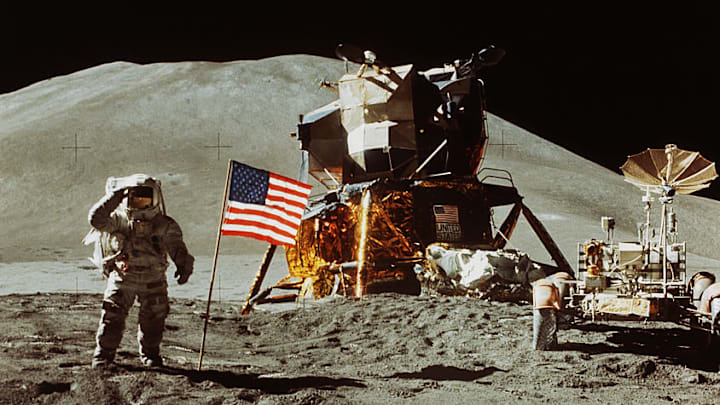For decades, science fiction authors have imagined the moon as one of humanity’s great land conquests, home to space colonies, space prisons, space labs, and space apartments. Jules Verne wrote that we would arrive there by firing astronauts out of a cannon. Robert Heinlein conceived of a moon base that resists governance from Earth and revolts.
With several countries—including Russia, India, and China—making plans for a crewed moon mission for the first time since the United States last touched down in 1972, the question of who has a claim to the moon and its resources is less a speculative fiction subject and more one for lawyers. Specifically, space lawyers.
In a post for Real Clear Science, Frans von der Dunk, an attorney and professor of space law (honestly) at the University of Nebraska-Lincoln's College of Law, examined the question of moon ownership. Two years before Americans landed on the lunar surface for the first time in 1969, countries including the U.S. and the Soviet Union prepared and committed to the 1967 Outer Space Treaty, which solidified the moon as a “global commons.” It could belong to no single nation, and its secrets, resources, and other untapped potential would be in the service of the greater good. As a goodwill effort, the U.S. even shared soil and rock samples with the USSR in spite of the Cold War.
While no nation can assert land rights on the moon, the question of who owns resources cultivated from both the moon and asteroids—which are also materially part of the treaty—is not so clear. If a country is able to mine minerals and other space resources, are they able to claim possession, or must they be shared with the rest of the world?
Von der Dunk isn’t quite sure, which is why space law and space lawyers, though they sound comical, are probably going to be very real and very needed in the near future. It might be that mining asteroids or the moon becomes akin to commercial fishing: So long as you’re licensed, you can keep what you catch. But some countries, like Russia, believe anything extracted from space should have communal benefits to humanity as a whole.
One thing is certain: Neil Armstrong planting a U.S. flag on the moon probably won’t mean a whole lot in space court.
Have you got a Big Question you'd like us to answer? If so, let us know by emailing us at bigquestions@mentalfloss.com.
Discover More Fascinating Stories About Space:
A version of this story was published in 2018; it has been updated for 2025.
